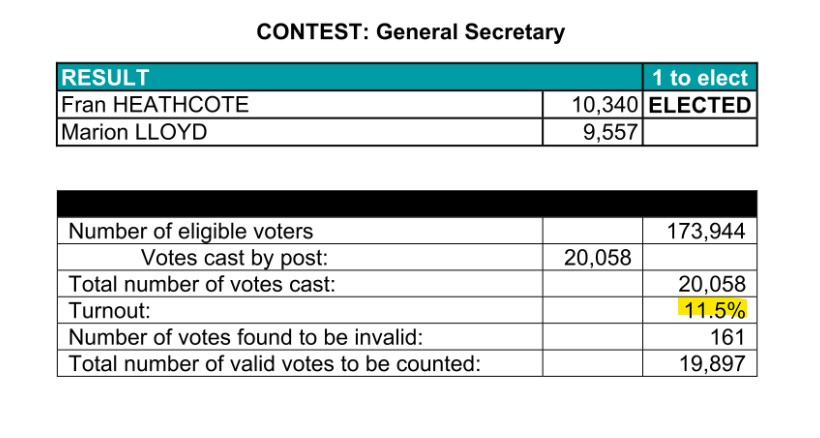

By PCS activists
Members of the Public and Commercial Services union (PCS) voted in November and December to elect Fran Heathcote as General Secretary and re-elect John Maloney to the role of Assistant General Secretary.
The defeat of PCS’s cost-of-living pay strikes dominated the election and anger at the leadership’s failed strategy nearly cost Heathcote her victory. Challenger Marion Lloyd representing the oppositional Broad Left faction secured 9,557 votes to Heathcote’s 10,340, with just 783 votes separating them.
Maloney of the Independent Left, who campaigned against the sell-out of the pay strikes, retained his position with a larger margin. His opponent is an unelected union official who, like Heathcote, had the backing of outgoing General Secretary Mark Serwotka, and stood with Heathcote on the Left Unity faction’s platform. Maloney secured 11,705 votes and his challenger 8,152.
While the election was close run and fiercely contested by union activists on both sides of the pay debate, the low turnout of just 11.5% compared with 18.6% in 2019. This reflects a level of demoralisation in the union’s membership. The engagement in the election is in stark contrast to the pay strike mobilisation, which saw historic turnouts for both ballots and picket lines.
All factions will now be looking to the National Executive Committee elections and the possibility Heathcote may find herself a ‘lame duck’ General Secretary if the Independent Left and Broad Left defeat her Left Unity faction.
However, the low engagement with the GS and AGS elections will not be overcome by another election and we must learn the lessons of our defeats in the PSC Says No campaign and the General Secretary election.
The strike wave showed that the key is rank and file organising. NHS Workers Say No was able to defeat their bad deal because they were already a national organisation when the strike wave began, having formed in opposition to another terrible pay deal in 2018. They campaigned around NHS pay ever since. Rank and file organisations that formed in response to sell-outs that were already underway – PCS Say No, Posties Say No – were less successful and demonstrated the need to embed rank and file organising in the unions.
If we in PCS can develop what we began with PCS Says No, we would not only be ready for any future bad deals, but we could work to strengthen and democratise our union to avoid them in the first place. We need membership control of disputes and the election and recallability of all paid officials. It is not enough to fight for power at the top of the union through the routine of elections – we also have to organise rank and file campaigning from below.
Those branches that led PSC Say No should convene a national meeting in light of the election results to organise ourselves as a campaigning rank and file group in the union. We can mobilise our branches to campaign against the continuing attacks on civil servants, starting with the renewed threat of job cuts and the 60% office attendance instruction, which is taking money out of already squeezed pay packets.